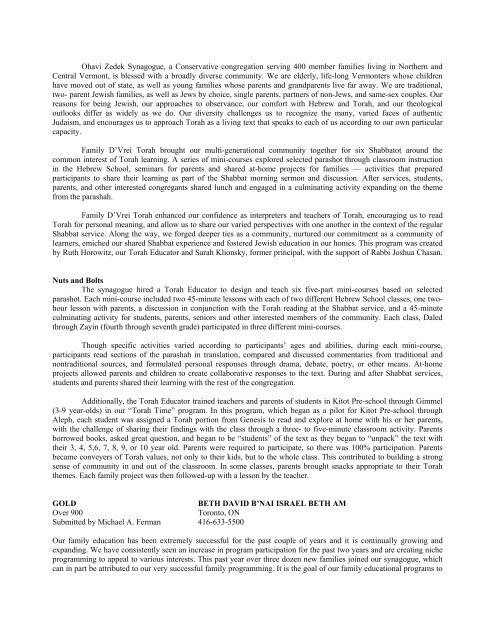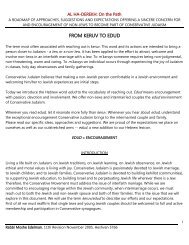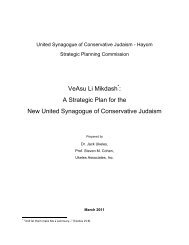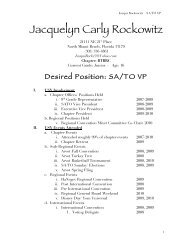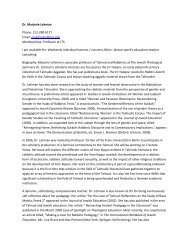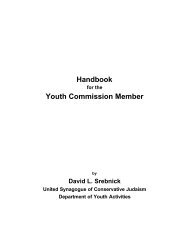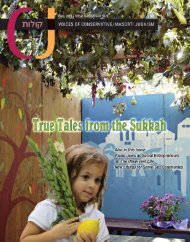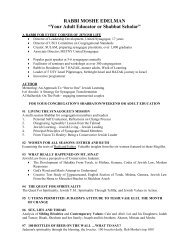2007 - United Synagogue of Conservative Judaism
2007 - United Synagogue of Conservative Judaism
2007 - United Synagogue of Conservative Judaism
You also want an ePaper? Increase the reach of your titles
YUMPU automatically turns print PDFs into web optimized ePapers that Google loves.
Ohavi Zedek <strong>Synagogue</strong>, a <strong>Conservative</strong> congregation serving 400 member families living in Northern and<br />
Central Vermont, is blessed with a broadly diverse community. We are elderly, life-long Vermonters whose children<br />
have moved out <strong>of</strong> state, as well as young families whose parents and grandparents live far away. We are traditional,<br />
two- parent Jewish families, as well as Jews by choice, single parents, partners <strong>of</strong> non-Jews, and same-sex couples. Our<br />
reasons for being Jewish, our approaches to observance, our comfort with Hebrew and Torah, and our theological<br />
outlooks differ as widely as we do. Our diversity challenges us to recognize the many, varied faces <strong>of</strong> authentic<br />
<strong>Judaism</strong>, and encourages us to approach Torah as a living text that speaks to each <strong>of</strong> us according to our own particular<br />
capacity.<br />
Family D’Vrei Torah brought our multi-generational community together for six Shabbatot around the<br />
common interest <strong>of</strong> Torah learning. A series <strong>of</strong> mini-courses explored selected parashot through classroom instruction<br />
in the Hebrew School, seminars for parents and shared at-home projects for families — activities that prepared<br />
participants to share their learning as part <strong>of</strong> the Shabbat morning sermon and discussion. After services, students,<br />
parents, and other interested congregants shared lunch and engaged in a culminating activity expanding on the theme<br />
from the parashah.<br />
Family D’Vrei Torah enhanced our confidence as interpreters and teachers <strong>of</strong> Torah, encouraging us to read<br />
Torah for personal meaning, and allow us to share our varied perspectives with one another in the context <strong>of</strong> the regular<br />
Shabbat service. Along the way, we forged deeper ties as a community, nurtured our commitment as a community <strong>of</strong><br />
learners, emiched our shared Shabbat experience and fostered Jewish education in our homes. This program was created<br />
by Ruth Horowitz, our Torah Educator and Sarah Klionsky, former principal, with the support <strong>of</strong> Rabbi Joshua Chasan.<br />
Nuts and Bolts<br />
The synagogue hired a Torah Educator to design and teach six five-part mini-courses based on selected<br />
parashot. Each mini-course included two 45-minute lessons with each <strong>of</strong> two different Hebrew School classes, one twohour<br />
lesson with parents, a discussion in conjunction with the Torah reading at the Shabbat service, and a 45-minute<br />
culminating activity for students, parents, seniors and other interested members <strong>of</strong> the community. Each class, Daled<br />
through Zayin (fourth through seventh grade) participated in three different mini-courses.<br />
Though specific activities varied according to participants’ ages and abilities, during each mini-course,<br />
participants read sections <strong>of</strong> the parashah in translation, compared and discussed commentaries from traditional and<br />
nontraditional sources, and formulated personal responses through drama, debate, poetry, or other means. At-home<br />
projects allowed parents and children to create collaborative responses to the text. During and after Shabbat services,<br />
students and parents shared their learning with the rest <strong>of</strong> the congregation.<br />
Additionally, the Torah Educator trained teachers and parents <strong>of</strong> students in Kitot Pre-school through Gimmel<br />
(3-9 year-olds) in our “Torah Time” program. In this program, which began as a pilot for Kitot Pre-school through<br />
Aleph, each student was assigned a Torah portion from Genesis to read and explore at home with his or her parents,<br />
with the challenge <strong>of</strong> sharing their findings with the class through a three- to five-minute classroom activity. Parents<br />
borrowed books, asked great question, and began to be “students” <strong>of</strong> the text as they began to “unpack” the text with<br />
their 3, 4, 5,6, 7, 8, 9, or 10 year old. Parents were required to participate, so there was 100% participation. Parents<br />
became conveyers <strong>of</strong> Torah values, not only to their kids, but to the whole class. This contributed to building a strong<br />
sense <strong>of</strong> community in and out <strong>of</strong> the classroom. In some classes, parents brought snacks appropriate to their Torah<br />
themes. Each family project was then followed-up with a lesson by the teacher.<br />
GOLD<br />
BETH DAVID B’NAI ISRAEL BETH AM<br />
Over 900<br />
Toronto, ON<br />
Submitted by Michael A. Ferman 416-633-5500<br />
Our family education has been extremely successful for the past couple <strong>of</strong> years and it is continually growing and<br />
expanding. We have consistently seen an increase in program participation for the past two years and are creating niche<br />
programming to appeal to various interests. This past year over three dozen new families joined our synagogue, which<br />
can in part be attributed to our very successful family programming. It is the goal <strong>of</strong> our family educational programs to


